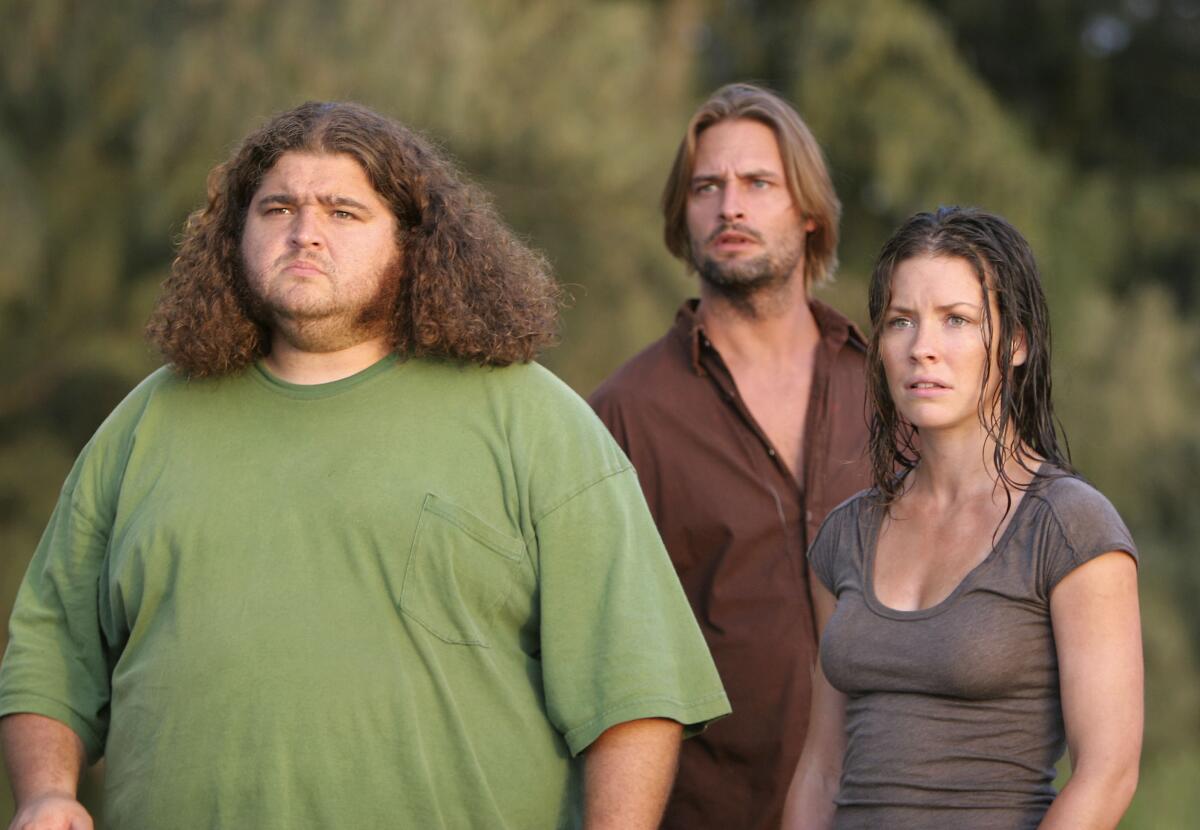Going back to the island with a ‘Lost’ podcast and why rewatch shows are taking over

- Share via
“Hey, Sammy, this is Tom Friendly.”
That’s how the actor M.C. Gainey introduced himself when he surprised me with a phone call while I mingled with other environmental journalists at a conference in Pittsburgh. I was dumbfounded until I remembered I had emailed his agent that morning asking for an interview.
Gainey sounded exactly like his TV character on “Lost,” with the same gruff, quietly menacing voice that told plane crash survivor Michael, father of 10-year-old Walt, “We‘re gonna have to take the boy.”
And now I could ask him all about that scene. I was stoked.
When “Lost” ended its six-year run on ABC nearly a decade ago, I was a 17-year-old high school senior who watched each episode religiously and looked forward to sharing theories with my friends the next morning. I never dreamed the show would be a bigger part of my life now than it was then.
And yet here I am, co-hosting “The Hatch: A Lost Podcast.” Every week, I rewatch an episode of “Lost” and analyze it with my friend and fellow journalist Rosalie Murphy, editor-in-chief of Akron magazine the Devil Strip. Every week, we share an interview with a member of the cast or crew, or sometimes an academic who has written about the show.
We’re nearing the end of Season 3, meaning we recently cringed our way through “Stranger in a Strange Land” (the Jack tattoo flashback) and are eagerly awaiting the creative highs of “Through the Looking Glass.” We’ve debated science versus faith, fate versus free will and the nature of the island.
We’ve also been lucky enough to interview some of the show’s finest actors, including Michael Emerson (Benjamin Linus), Henry Ian Cusick (Desmond Hume), Sonya Walger (Penny Widmore) and Néstor Carbonell (Richard Alpert). We even talked with co-creator and showrunner Damon Lindelof.
For huge “Lost” fans like me and Rosie, we’re basically living the dream.
And we’re not the only ones: There’s a whole cottage industry of podcasters revisiting their favorite TV shows.
There are dozens of active rewatch podcasts, including “Bring Backup” (“Veronica Mars”); “Bygones” (“Ally McBeal”); “Battlestar Galacticast,” co-hosted by Tricia Helfer, the actor who played Cylon model Number Six in the early-2000s “Battlestar Galactica” remake; and most recently “Office Ladies,” hosted by “The Office” stars Jenna Fischer and Angela Kinsey.
In fact, it was an article about “The West Wing Weekly” — a rewatch podcast co-hosted by “West Wing” actor Joshua Molina — that gave Rosie the idea to make “The Hatch.”
What we didn’t know when we started is that there are at least half a dozen active “Lost” rewatch podcasts.
“The Lost Boys” features one co-host watching the show for the eighth time and another watching it for the first time. “Freckles and Blondie” also has two hosts, one a Jack fan and the other a Sawyer fan. “The Storm” starts each episode with a spoiler-free discussion for first-time viewers.
Jason Mittell, who chairs the film and media culture department at Middlebury College, said rewatch podcasts may be today’s version of the “proverbial water-cooler talk,” where fans would gather to discuss the previous night’s episode. In the early internet era, some of that discussion shifted to online forums, which was certainly the case for “Lost.” But as streaming services allowed TV viewers to watch shows both new and old at their own pace, Mittell said, those natural communities of devoted fans watching the same episodes at the same time began to break down.
MORE AUDIOSPHERE: Documenting some of podcasting’s most fascinating shows
“Podcasts mimic the broadcast schedule with regular episode releases (often weekly), so they can recreate some of the structure that traditional schedules provided,” Mittell said via email. “Plus even though they are not interactive, the conversational basis of podcasts feels more like chatting with friends than reading an episode review/recap.”
Jonathan Gray, a media studies professor at the University of Wisconsin-Madison, described rewatch podcasts as a sort of virtual book club, where fans can move through a show as quickly or as slowly as they want. Podcasts also offer a “deep dive” that fans may not have gotten the first time a show aired.
“Water-cooler discussions are short,” Gray said. “You’re not meant to spend 45 minutes at the water cooler talking about last night’s episode of ‘Lost.’”
Even as a journalist who’s talked to plenty of high-profile people, I sometimes have to pinch myself when doing interviews for “The Hatch.”
Rosie and I worried at first that no one would talk to us. But in an extremely West L.A. coincidence, a rabbi who had taught me in Jewish religious school is married to Jack Bender, the show’s primary in-house director.
She made the introduction, and Bender was our first guest. I sat down with him at his Brentwood home, where he recalled that one of the show’s writers hated Damon Lindelof’s (brilliant) idea that John Locke was paralyzed before coming to the island.
“Damon, God bless him, had the creative balls to stick with the idea,” Bender told me.
Henry Ian Cusick — who goes by Ian, we quickly learned — wasn’t wearing a shirt the entire time I video chatted with him. At one point, we were interrupted when a bird flew through his house. Cusick, who earned an Emmy nomination for his role as Desmond, explained that he and his wife never left Hawaii, where “Lost” was filmed, and they live close to the beach — hence the birds.
“They can fly right through and out the other side. So we just let them,” he said, as if it was the most normal thing in the world.
When Rosie and I started “The Hatch,” I also worried that listeners would complain to us constantly about the controversial series finale. Would our guests insist on defending the ending, which many fans thought failed to answer the show’s biggest questions? And would their defenses spur even more listener frustration, setting off a never-ending feedback loop that would cast a shadow over the fun of reliving the show’s greatest hits?
But I needn’t have worried. If I’ve learned anything from podcasting about “Lost,” it’s that all these years later, the finale no longer feels nearly as important as it once did.
Rosie and I do frequently discuss how our perspective on the characters is changed by having seen the ending — that’s part of the fun of watching and analyzing with hindsight. But the show’s cast and crew are a lot more interested in talking about the stuff that came before the finale — and so are we.
We laughed when Michael Emerson, who won an Emmy for his role as Ben, told us how people still “bitch about the ending” when they see him crossing the street in Manhattan. But he didn’t dwell on it. He was soon marveling at the fraught relationship between his character and Ben’s “great adversary,” Terry O’Quinn’s John Locke.
“You want those pressure-cooker scenes where so much is at stake, where the language is precise, careful, where there’s real philosophical or ethical stakes,” Emerson said. “We always had that. One or the other of us was always under duress, being held, chained, shackled, either really or metaphorically, and the other probing, probing. Like fencing, or like a game of chess, maybe. A sense of gamesmanship at a level of stakes off the chart.”
“Life-and-death conversations. Not necessarily physical danger, but moral danger. Ethical danger,” Emerson said. “It was great.”
Andrew Divoff — who played the Others’ one-eyed, death-defying enforcer Mikhail Bakunin — was similarly eloquent when I asked him why he thought his character was named for a famous Russian anarchist. He recalled being asked during his casting for his opinion about “Lost.” He said he thought about the fact that several of the show’s characters were named after philosophers, before responding with two words: “Avatars and demigods.”
“Naming the characters for these philosophers is sort of naming them for our better angels, if you will, our higher selves. What we aspire to,” he told me.
It’s hard to pick just a few highlights from the interviews.
There was the time writer Leonard Dick and I bonded over our love of the show’s repentant Iraqi torturer, Sayid Jarrah, and Leonard excitedly declared himself the “vice president of Sayid Inc.” Or the time I asked Néstor Carbonell if he could record some dialogue for our Season 3 teaser. Not only did he say yes, he insisted on getting into character as Richard Alpert first. He practiced his lines several times before he felt ready — and even suggested some changes.
One of my favorite guests was Jean Higgins, an unsung hero of “Lost.” Officially a co-executive producer, she worked on the show from start to finish in Hawaii, where she and Jack Bender were in charge of basically everything. She described herself as “the one who had to figure out how to bring it to life.”
“They would deliver me the most incredible scripts,” Higgins said. “I take the script, I break it down, I figure out what it costs, I figure out the schedule that we’re going to shoot it, the order that we’re going to shoot it in, how to essentially gather all the people and the resources in order to create it.”
More than anything, I’ve been struck by how grateful these people are to have worked on “Lost.”
It’s not just that “Lost” became a massive cultural phenomenon, they’ve said, although that’s part of it. It’s also the community they built in Hawaii, sequestered for years on a real-life island.
When I thanked Carbonell for talking with me, he reacted like I’d said something silly.
“Are you kidding me? Thank you so much for doing this. This is exciting for me, just to get to relive and talk about,” he said.
I asked him if he wasn’t sick of “Lost” from people stopping him on the street and asking him about it.
“I don’t know how anybody could get sick of that,” he said.
I know I’ll never recreate the experience of watching “Lost” for the first time, not knowing what was in the hatch or how the show would end. I’ll never be 17 years old again, staying up past midnight to watch the 104-minute marathon of a finale because I couldn’t risk being spoiled at school the next day.
But Rosie and I aren’t trying to recreate those days, either.
We’re trying to take a show that kept us guessing and understand what makes it great now that there’s nothing left to guess. We’re trying to give fans an excuse to spend some more time with the characters they loved. And we’re trying to give the people who made the show an opportunity to reflect on what it meant to them, and how it changed television.
And those are pretty good reasons to go back.
When he’s not rewatching “Lost,” Sammy Roth covers energy for the Los Angeles Times.
More to Read
The complete guide to home viewing
Get Screen Gab for everything about the TV shows and streaming movies everyone’s talking about.
You may occasionally receive promotional content from the Los Angeles Times.







